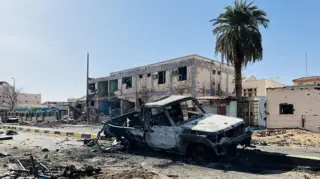Africa analyst
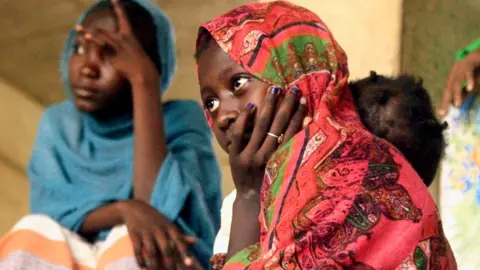 AFP/Getty Images
AFP/Getty ImagesSudan’s war is in strategic stalemate. Each side stakes its hopes on a new offensive, a new delivery of weapons, a new political alliance, but neither can gain a decisive advantage.
The losers are the Sudanese people. Every month there are more who are hungry, displaced, despairing.
The Sudan armed forces triumphantly announced the recapture of central Khartoum in March.
It broadcast pictures of its leader, Gen Abdel Fattah al-Burhan, walking through the ruins of the capital’s Republican Palace, which had been controlled by the paramilitaries of the Rapid Support Forces (RSF), since the earliest days of the war in April 2023.
The army deployed weapons newly acquired from Egypt, Turkey and other Middle Eastern countries including Qatar and Iran. But its offensive quickly stalled.
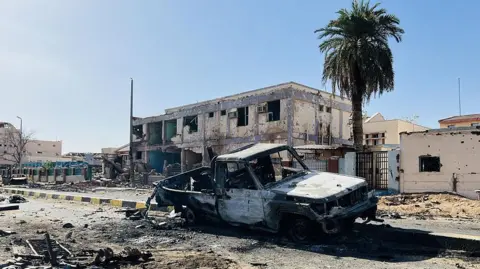 Anadolu/Getty Images
Anadolu/Getty ImagesThe RSF, headed by Gen Mohamed Hamdan Dagalo, known as “Hemedti”, responded with a devastating drone attack on Port Sudan, which is both the interim capital of the military government and also the main entry point for humanitarian aid.
These were long-range sophisticated drones, which the army accuses the United Arab Emirates (UAE) of supplying – a charge the UAE rejects, along with well-documented reports that it has been backing the RSF during the 27-month conflict.
The RSF has also expanded operations to the south of Khartoum.
Hemedti struck a deal with Abdel Aziz al-Hilu, the veteran rebel commander of the Sudan People’s Liberation Army-North, which controls the Nuba Mountains near the border with South Sudan.
Their forces combined may be able to make a push to the border with Ethiopia, hoping to open new supply routes.
Meanwhile, the RSF has been besieging the capital of North Darfur, el-Fasher, which is defended by a coalition of Darfurian former rebels, known as the Joint Forces, allied with the army.
Most of the fighters are ethnic Zaghawa, who have been in fierce conflict with the Arab groups that form the core of the RSF.
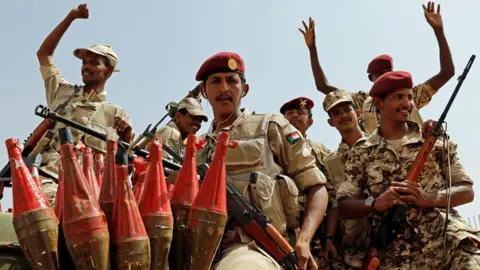 Reuters
ReutersMonth after month of blockade, bombardment and ground attacks have created famine among the residents, with the people of the displaced camp of Zamzam worst-hit.
The RSF and its allied Arab militias have a terrifying record of massacre, rape and ethnic cleansing. Human rights organisations have accused it of genocide against the Massalit people of West Darfur.
Zaghawa communities in el-Fasher fear that if the Joint Forces are defeated, they will suffer savage reprisals at the hands of the RSF.
The pressure on el-Fasher is growing. Last week the RSF captured desert garrisons on the border with Libya held by the Joint Forces.
The military has accused forces loyal to Libyan strongman Gen Khalifa Haftar, who controls the east of the country and is also a reported beneficiary of Emirati support, of joining in the attack.
Sudan’s civilians, who six years ago managed the extraordinary feat of overthrowing the country’s long-time leader Omar al-Bashir through non-violent protests, are in disarray.
Different groupings are aligned with Burhan, with Hemedti, or trying to stake out a neutral position. They are all active on social media, polarised, acrimonious and fragmented.
The neighbourhood committees that were the driving force of the civic revolution are clinging to life.
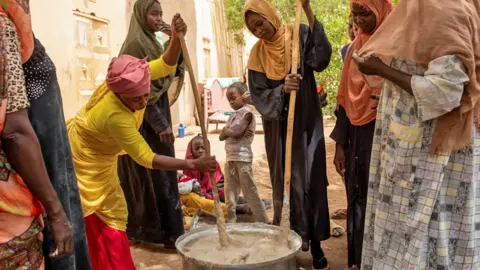 Reuters
ReutersMost have kept their political heads down, focusing instead on essential humanitarian activities. Known as “Emergency Response Rooms”, aid workers recognise that they are the most efficient channel for life-saving assistance.
But many lost their funding when the administration of US President Donald Trump closed down USAID, and other donors have not stepped into the breach.
The army and RSF both see any form of civic activism as a threat.
They are cracking down, arresting, torturing and killing national aid workers and human rights activists.
There is no credible peace process.
The UN’s chief diplomat assigned to Sudan, former Algerian Prime Minister Ramtane Lamamra, formulated a peace plan that was premised on the assumption that the army would achieve a military victory.
All that would be left to negotiate would be the disarmament of the RSF and the reconstruction of the country. That is totally unrealistic.
Burhan has a big diplomatic advantage over Hemedti because the UN has recognised the military side as the government of Sudan, even when it did not control the national capital.
Hemedti’s attempt to launch a parallel administration for the vast territories controlled by the RSF has gained little credibility.
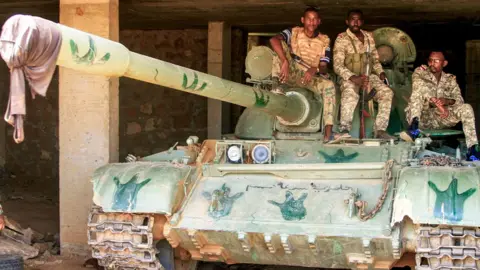 AFP/Getty Images
AFP/Getty ImagesForeign ministers at a conference in London in April, hosted by British Foreign Secretary David Lammy, failed to agree a path to peace. The conference chairs had to settle for a statement that covered familiar ground.
On this occasion, as before, progress was blocked because Saudi Arabia and the UAE could not agree.
Diplomats acknowledge that Sudan’s war is an African problem that needs an Arab solution.
The road to peace in Khartoum runs through Abu Dhabi, Riyadh and Cairo.
For Egypt, the big question is whether Burhan is able to distance himself from Sudan’s Islamists.
Under Bashir, the Islamist movement was in power for 30 years, and established a formidable and well-funded organisation, that still exists.
The Islamists mobilised combat brigades that were key to the army’s recent victory in Khartoum.
Egypt’s President Abdul Fattah al-Sisi supports Burhan and wants him to sideline the Islamists, but knows that he cannot push the Sudanese general too far.
This question takes on added salience with Israel’s attack on Iran and the Islamists’ fear that they are facing an irreversible defeat.
The other big question is whether the UAE will step back from supporting Hemedti.
After the RSF lost Khartoum, some hoped that Abu Dhabi might seek a compromise – but within weeks the RSF was deploying drones that appear to have come from the UAE.
The UAE is also facing strategic challenges, as it is an outlier in the Arab world in its alignment with Israel.
No-one wants to see Sudan divided. But the reality of the war points towards a de facto partition between bitterly opposed warring camps.
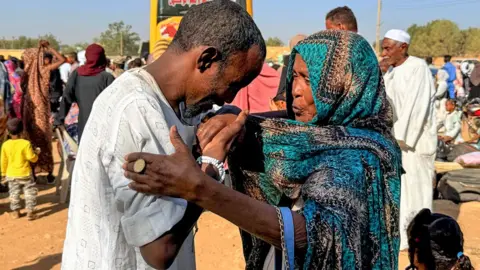 AFP/Getty Images
AFP/Getty ImagesMeanwhile, the world’s largest and deepest humanitarian emergency worsens with no end in sight.
More than half of Sudan’s 45 million people are displaced. Nearly a million are in famine.
Both sides continue to restrict aid agencies’ access to the starving. The UN’s appeal for $4.2bn (£3bn) for essential aid was only 13.3% funded in late May.
Globally and among the Arab world’s powerbrokers, Sudan is no-one’s priority, an orphan in a region that is ablaze.
It is a country where the multilateral organisations – the United Nations and the African Union – could still be relevant.
They can remind all of their commitments to human rights and human life, and that it is in no-one’s interest to see Sudan’s catastrophe continue to unfold.
The long-suffering Sudanese people surely deserve that quantum of mercy.
Alex de Waal is the executive director of the World Peace Foundation at the Fletcher School of Law and Diplomacy at Tufts University in the US.
 Getty Images/BBC
Getty Images/BBC